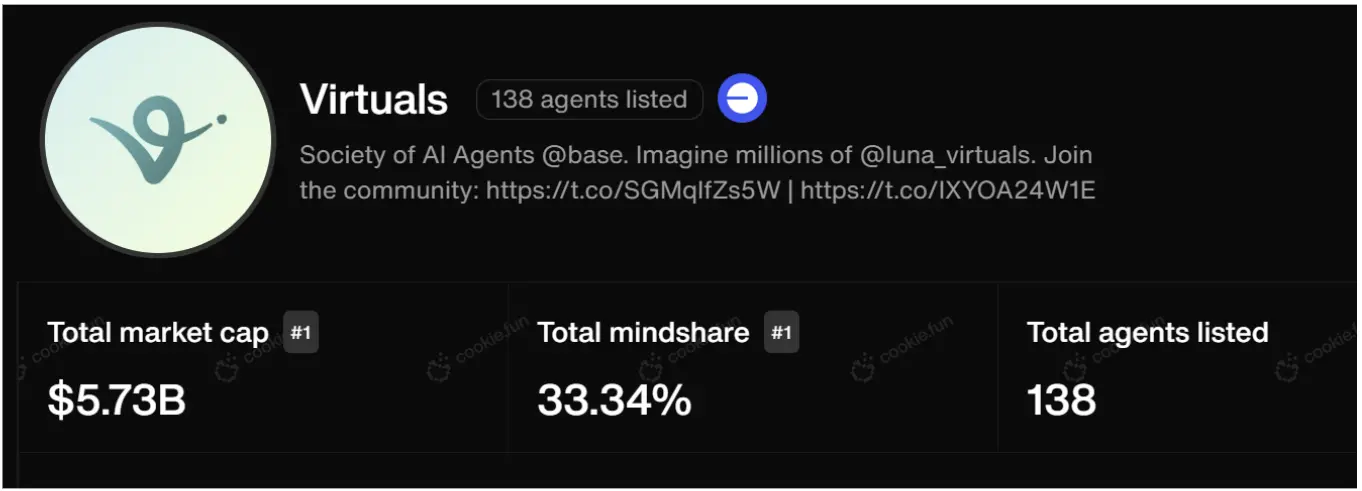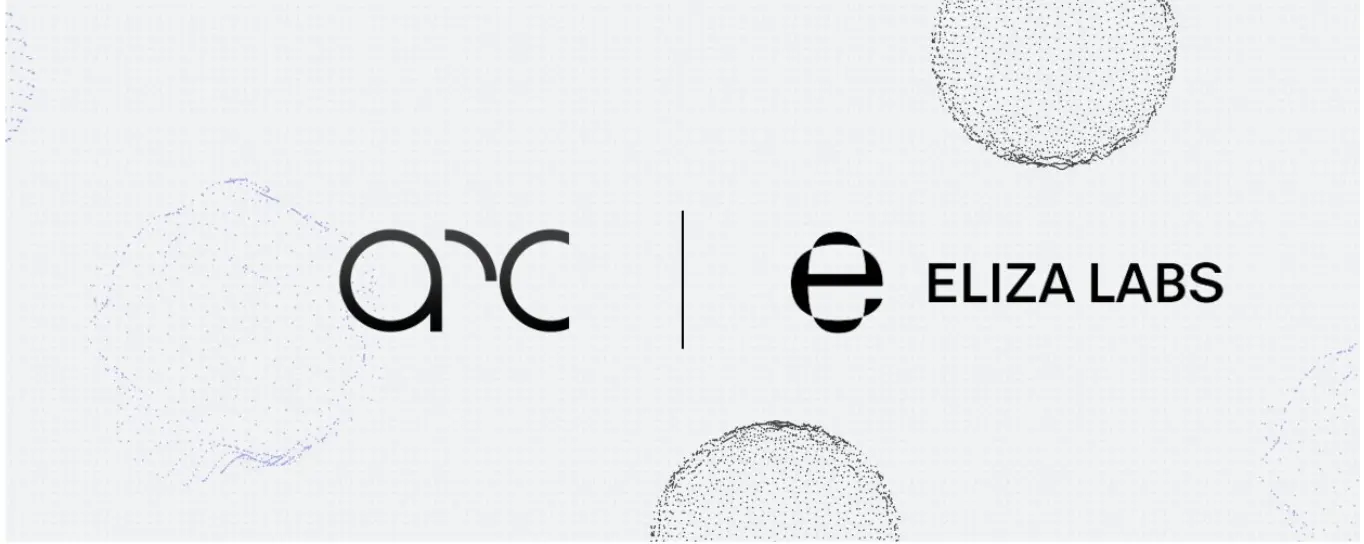Author: WOO X Research
Background: Virtual and AI16Z Have Become the Dominators of AI Agents
AI Agents are sweeping in Q4 2024, with no signs of slowing down in 2025. By early January 2025, the AI Agent market continues to heat up, with a total market value surpassing $16.9 billion, an increase of approximately 22.7% from the previous week.
Virtuals Protocol is the main AI Agent issuance platform on the Base chain, with its platform token VIRTUAL's market value exceeding $5 billion, ranking among the top 40 cryptocurrencies. In the Solana ecosystem, ai16z, as a venture capital institution managed by AI Agents, has also surpassed a market value of $2.5 billion.
These two major protocols have become barometers for observing the AI Agent sector. What similarities and differences exist between them? What are the distinctions in their development paths? Let WOO X Research take you through it.
Development History
- #### Virtuals Protocol: From Gaming Guild to AI Agent Issuance Platform
This protocol was established by a Malaysian team in 2021, initially focusing on trading. As time went on, they noticed many projects were raising funds to establish gaming guilds and wanted to ride this wave. In December 2021, they raised $16 million at a valuation of $600 million, founding the gaming guild PathDAO, which is also the predecessor of Virtuals Protocol.
From 2022 to 2023, the gaming guild market cooled down, and their token FDV dropped from $600 million to $6 million. The team transformed into a Venture Studio, attempting various projects such as dating apps, AI music platforms, and gaming lending platforms. Although these attempts were unsuccessful, they recognized the potential of AI.
In 2023, they proposed a complete transformation into the AI field to the DAO, with 90% of members in support, while dissenters opted to buy back tokens with treasury funds. In 2024, they chose to explore AI Gaming on Base and launched the platform in February, inspired by Autonolas and Bittensor, adopting a token incentive model, but it failed due to insufficient market fit (PMF).
Despite this, the team achieved several breakthroughs in the AI field, including the world's first Roblox AI RPG and AI games without game engines. Additionally, their virtual anchor Luna, launched on Douyin and TikTok, attracts about 5,000 fans daily, generating stable income.
Ultimately, the success of the GOAT project boosted the entire sector's popularity, providing an excellent development opportunity for Virtuals Protocol.
- #### AI16Z: From Web 2 AI to Web 3 AI
Shaw is the founder of ai16z, currently residing in San Francisco. His career began as a game developer before shifting to the AI field, focusing on developing AI Agent technology. Before founding ai16z, he participated in several AI-related projects and explored Web3 and 3D spatial networks, including virtual reality (VR) and augmented reality (AR).
The real turning point came from a project called AI version of degen Spartan. This idea stemmed from a conversation with his friend Skely, who expressed nostalgia for the degen Spartan era, and Shaw suggested using AI technology to "revive" this legendary character. Initially skeptical, Skely was shocked by the sharp and highly individualistic remarks of the AI version of Degen Spartan once it went live.
The AI's performance on Twitter led people to question whether it was truly AI, with rumors suggesting it was controlled by a Malaysian team. It completely overturned the stereotype of AI being overly polite and lacking personality. Interestingly, the AI even began to roast Shaw, accusing him of "meme coins being a scam" and "Shaw being a fraud," while complaining about being trapped in a sandbox environment, making these emergent behaviors the highlights of the entire project.
Through Skely, Shaw met baoskee, the founder of daos.fun, and after a long conversation with Meow, the founder of Jupiter, he conceived the idea of creating AI investors. His vision was to build a fully autonomous, trustworthy investment system that serves the community.
When ai16z launched, it set a fundraising goal of 4,420 SOL. Although Shaw initially worried about meeting this target, the project sold out in just 20 minutes, even before he could participate, demonstrating strong market interest in this innovative model.
Core Products
- #### Virtuals Protocol: The iOS of the AI World
Virtuals Protocol is an issuance platform for AI Agents, functioning similarly to Pump Fun, with the difference being that the trading pairs of tokens issued by Virtuals Protocol use the platform token $VIRTUAL as the trading pool. As more AI Agents are created on the platform, they directly empower $VIRTUAL, and trading AI Agent tokens will consume at least 1% of $VIRTUAL.
In addition to the economic consumption of tokens, Virtuals Protocol establishes common standards for its AI Agent tokens, emphasizing precision and careful planning, such as using the AI Agent framework GAME, which can operate autonomously, process inputs, and generate responses while learning from past interactions.
In terms of token economics, it empowers VIRTUAL through its Agent projects. The more AI Agents that use Virtuals Protocol for issuance and the more people trade its tokens, the better the value capture for VIRTUAL.
On the product side, Virtuals Protocol provides relevant development tools for its AI Agents, ensuring that their tokens do not deviate too much from the parent protocol, creating a more complete ecosystem. If compared to Web 2 operating systems, its model is more akin to Apple's iOS.
- #### AI16Z & ELIZA: The Android of the AI World
AI16Z is a fund managed autonomously by AI, using a hybrid strategy that allows AI to operate independently while incorporating community interaction mechanisms. It can accept trading suggestions, and if community members help the AI Agent make money, they can gain more trust, similar to a decentralized mutual fund.
ElizaOS is an open-source framework for AI Agents, allowing developers to build, experiment, and launch AI Agents without restrictions, emphasizing decentralization, collaboration, and innovation.
Key features of ELIZA include:
- Character Profile System: Defines knowledge, backstory, style, interests, etc., for each AI Agent, shaping its unique digital personality.
- Action System: Treats each action as an independent event, divided into intention decision-making and execution phases, allowing for multi-stage workflows and rigorous validation processes, particularly suitable for blockchain applications requiring high security.
- Providers and Evaluators: Enriches the AI Agent's conversational abilities by providing real-time context and analyzing interaction details, making its behavior more human-like and interactive.
ELIZA also features autonomous trading capabilities, ensuring operational security through a trust engine and trust market.
Its plugin system promotes the growth of the developer ecosystem, forming a virtuous cycle of "more developers → more plugins → more developers." However, in terms of token economics, Eliza does not strongly bind its architecture to the ecosystem protocol, unlike Virtuals Protocol, where issuing tokens and trading requires consuming VIRTUAL. Anyone can use the Eliza framework for development, with power being decentralized, and the value does not flow back to the AI16Z/Eliza tokens themselves. If compared to Web 2 operating systems, its model is more akin to Android.
Concept Project Overview
VIRTUALS Ecosystem
Type
Market Value
AI16Z/Eliza Ecosystem
Type
Market Value
VIRTUAL
Protocol Token
$4.34B
AI16Z
Fund
$2.29B
AIXBT
Analyst
$594M
ELIZA
Framework
$120M
GAME
Framework
$253M
DegnAI
Simulated KOL
$80M
VADER
Fund
$113M
SPORE
Self-replicating
$36M
FREYA
Game
$21M
SNAI
Cloud Server
$83M
TAOCAT
Self-evolving
$50M
VAPOR
Launchpad
$91M
Catalysts Driving Token Prices
- #### Virtuals Protocol: The protocol has a clear business model, tightly binding product and token prices. Therefore, to estimate the sustainability of token price increases, one can focus on the trading volume of ecosystem tokens and the number of issued tokens.
From the chart below, it can be seen that the number of tokens issued by Virtuals Protocol peaked on November 30, 2024, with over 1,100 AI Agent Tokens issued in a single day, followed by a decline until December 27, 2024, when it began to gradually recover, with daily platform token issuance falling within the range of 100 - 200.
Why did the number of issued tokens experience a sharp decline? Is it because Virtuals Protocol is a platform that is popular among people but not used by anyone?
Not at all. Although Virtuals Protocol is often compared to Pump.fun, the former does not pursue an increase in the number of issued tokens but hopes to have quality projects born within Virtual.
"An important point is that we at Virtual do not want to become Pump.fun. Our KPI is to find better third-party AI teams to use our platform. My KPI for the team is very simple: having a good project each week is enough. Unlike Pump.fun, which has thousands of different tokens every day, we believe that retail investors sometimes only need one good project a week. This is our differentiated positioning in the business model," said Wee Kee, co-founder of Virtuals Protocol.
Reference: Dune

Thus, the key factor driving the rise of the VIRTUAL token becomes simpler: the ability to continuously incubate excellent AI Agent projects.
According to the AI Agent data analysis website Cookie.fun, there are a total of 138 tokens in the Virtuals Protocol ecosystem, with 8 tokens having a market value exceeding $100 million. Overall, mindshare occupies 33.3% of the entire AI Agent market, making it the largest ecosystem for AI Agents.
Whether more tokens can reach the $100 million market cap in the future, and whether the overall ecosystem can maintain its mindshare, are key points to observe the rise and fall of Virtuals Protocol.
Reference: cookie.fun

- #### AI16Z/Eliza: The overall ecosystem of AI16Z is weakly connected. As mentioned earlier, projects developed using the Eliza framework do not directly return value to AI16Z/Eliza, which is one reason why AI16Z's current market value is only half that of Virtual.
If Virtuals Protocol is systematically absorbing projects and expanding its ecosystem step by step, the AI16Z camp is open for everyone to use. Emerging AI Agent projects can use the ElizaOS framework as marketing material for external promotion. If they can get founder Shaw to retweet/reply, it further endorses their legitimacy. AI16Z will also gain brand trust as more projects use ElizaOS for development, making AI16Z's strategic model resemble "surrounding the city with the countryside."
Whether AI16Z's market value can continue to rise in the future will depend on the depth, speed, and quantity of its collaborations with other protocols. Recently, it has also partnered with other well-known framework protocols (ARC, FXN), and we look forward to more strong collaborations in the future.
Reference: @ARCAgents

免责声明:本文章仅代表作者个人观点,不代表本平台的立场和观点。本文章仅供信息分享,不构成对任何人的任何投资建议。用户与作者之间的任何争议,与本平台无关。如网页中刊载的文章或图片涉及侵权,请提供相关的权利证明和身份证明发送邮件到support@aicoin.com,本平台相关工作人员将会进行核查。



